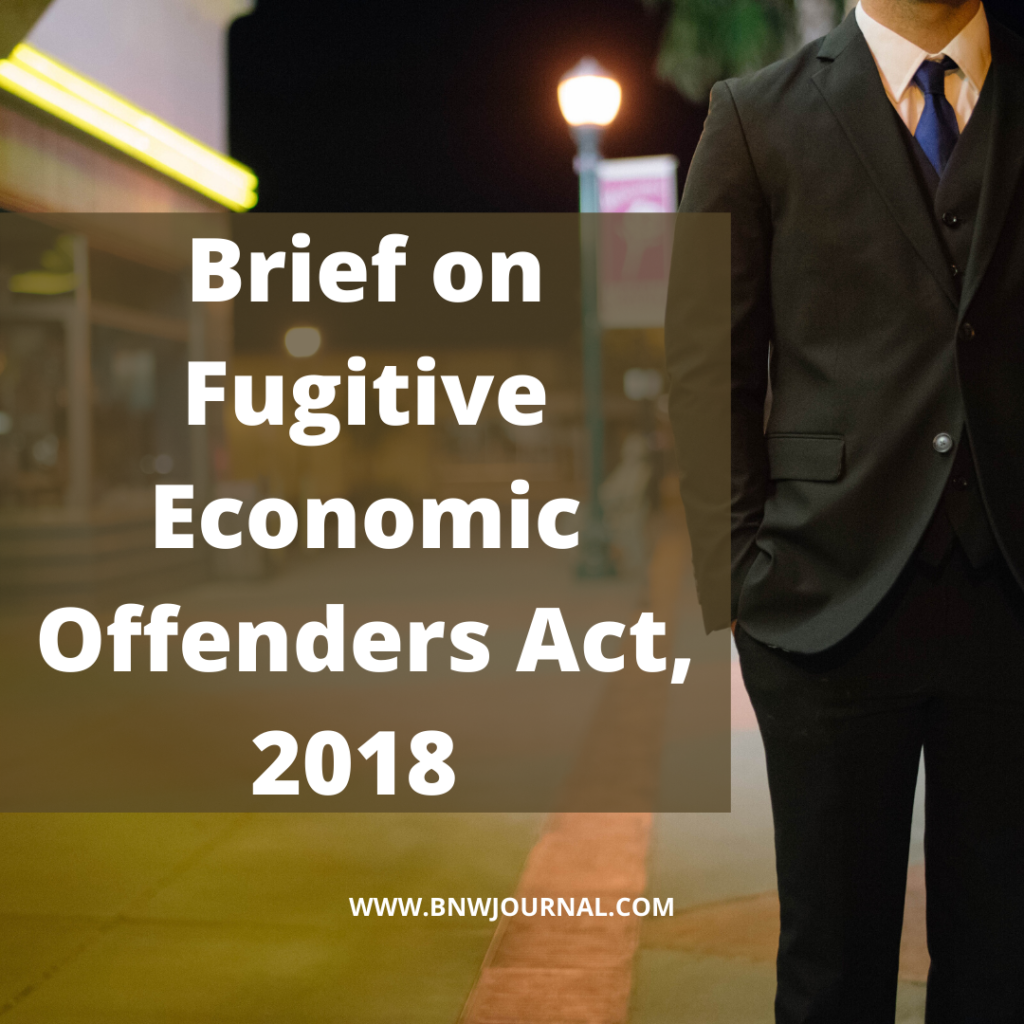![]()
Introduction
The Parliament of India enacted the Fugitive Economic Offenders Act, 2018 which is deemed to have come into force on 21st April 2018. In the wake of the various scams that shook the entire nation especially in the case of economic offences, the Indian Parliament felt the need of enacting a piece of legislation to prevent the big economic offenders from fleeing the country, thereby avoiding the legal prosecution. Economic offences are serious criminal offences that not only cause pecuniary losses to individuals, but also create huge repercussions on the entire economy of any country.

Some of the most important economic offences are offences relating to counterfeiting of currency, fraud, money laundering, tax evasion, company fraud, theft of intellectual property etc. While there exists, relevant legislation to punish offenders found guilty of such offences. It was felt that the existing laws could not address cases of high-value economic offenders. This fleeing the country to avoid legal consequences. Various other laws, that penalise economic offences are the Prevention of Money Laundering Act (PMLA), 2002 that prohibits money laundering. The Indian Penal Code that covers offences such as fraud, forgery and cheating. The Companies Act 2013 that covers instances of company fraud, the Benami Transactions (Prohibition) Act, 1988 which prohibits benami transactions etc.
The objective of the FEO Act is to deter fugitive economic offenders from evading the process of law in India. It is by staying outside the jurisdiction of Indian courts. Also to preserve the sanctity of rule of law in India.
Key Features of the Act
- According to Section 2(f) of the Act, a “fugitive economic offender” means any individual against whom a warrant for arrest; in relation to a Scheduled Offence has been issued by any Court in India, who –
- has left India to avoid criminal prosecution; or
- being abroad, refuses to return to India to face criminal prosecution.
- The term “Scheduled Offence” means and includes the offences specify in the Schedule to the Act. Provided the total value of such offence/offences is more than Rs. 100 crores. These offences include offences such as offences under the IPC, 1860, Negotiable Instruments Act, 1881, Central Excise Act, 1944. Also Customs Act, 1962, Prevention of Corruption Act, 1988, Prevention of Money Laundering Act, 2002, Companies Act, 2013 etc.
- The procedure for filing an application to declare an individual as a fugitive economic offender; define in Section 4 of the Act. It states that such an application can be file by a Director or any other officer. Not below in rank of a Deputy Director (as defined under the PMLA Act, 2002). This application should include details regarding the reasons for the belief that the person is declare a fugitive economic offender. Details of the properties including the list of benami properties (if any), for which the confiscation is being sought. List of persons who may have interest in such properties and the information as to the whereabouts of the offender. This application is to be file in the “Special Court”. This means the Sessions Court designate as a Special Court under Section 43(1) of the PMLA Act.
- Under Section 5 of the Act, the Director, after seeking permission of the Special Court (at any time before the filing of application) can also proceed with the attachment of properties. It is own by the economic offender. Whether the property is proceeds of crime or is a benami property. However, in such a case, the application under Section 4 will have to file by the Director. It must be within a period of 30 days from the date of such attachment. Such attachment of the property shall continue for a period of 180 days; from the date of the order of attachment. Or such other period as may be extend by the Special Court.
- As per Section 6 of the Act, the Director for the purposes of Section 4, shall have the same powers. As vest in a civil court under the Civil Procedure Code, 1908. These powers would be the powers of discovery and inspection, receiving evidence on affidavits. Also enforcing the attendance of any person, examining him on oath etc.
- Section 10 of the Act, provides for the issuing of notice by the Special Court to seek the presence of the alleged economic offender at a specified place on a specific date at least 6 weeks from the date of issuance of a notice, stating that a failure to appear will result in him being declared as an FEO.
- The detailed procedure of hearing the application has been specified in Section 11. It states that if the person to whom notice is issue appears, the Special Court will terminate the proceedings. If the person enters appearance through a counsel, the Special Court may give the counsel a week to file a reply to the application. The provision also states that if a person does not enter appearance either in person or through his counsel, the Special Court will proceed with hearing the application and after the hearing may declare the person as FEO.
- Once the Special Court declares an individual as an FEO, it may confiscate the properties of the FEO, which may be the proceeds of crime in India or in abroad, benami properties and other properties owned by the FEO. The Special Court may exempt certain properties from confiscation where any other person has a bona fide and legitimate interest in them. Upon confiscation, all the rights and titles in the confiscated property shall vest in the Central Government, free from all encumbrances. The Central Government may dispose of these properties within ninety days.
- A very interesting provision, of the Act, is Section 14, which bars a fugitive economic offender from continuing/ defending any civil claims before any court or tribunal. The section also puts a bar on the company or a limited liability partnership firm from filing or defending any civil claim if the promoter, key managerial personnel, or a majority shareholder has been declared FEO.
Case Law
In the matter of Vijay Vittal Mallya versus State of Maharashtra (Cr. Appeal No. 1407 of 2018), the Appellant- Mr Vijay Mallya filed an appeal in the Bombay High Court against the order dated 30th October 2018 passed by the Special Judge, Greater Mumbai that declared the Appellant- a Fugitive Economic Offender on a plea filed by the Enforcement Directorate under Section 4 of the FEO Act, 2018. The ED sought the fugitive economic offender tag for Mallya along with immediate confiscation of his properties worth Rs. 12,500 crores to be vest in the Union Government as per the provisions of the Act. Mr Mallya sought a stay on the hearing of the ED’s plea which was rejected by the Special Court.
This led to an appeal before the Bombay High Court. The Bombay High Court vide order dated 22nd November 2018 dismissed the appeal of the Appellant. The Appellant (Mr Mallya), filed an appeal before the Hon’ble Supreme Court against the order dated 22.11.2018 passed by the Bombay High Court. The matter is pending adjudication before the SC and notice has been issued to the Enforcement Directorate and State of Maharashtra vide order dated 7th December 2018 passed in SLP (Cr) No. 10314 of 2018.
Conclusion
The reason for the introduction of such a bill in the Parliament was the growing concern of the increase in the number of scams that India had been witnessing lately. While the FEO Act serves as a deterrent measure to the alleged economic offenders, as it allows the Central Government to take control over all their properties, experts have often raised questions as to the non-applicability of the act retrospectively.



0 Comments